Sales training: A guide from a sales enablement leader

Sales Enablement Program Manager

Tags
Share
To build a world-class sales engine (with world-class win rates), you need to hire the right personalities and reps. But that’s not where the job ends.
After you hire these brilliant salespeople, you still have to train them.
And the reality is that most successful salespeople are a product of some combination of natural talent, a good sales strategy—and the effectiveness of the training they are given.
But how exactly should you train your sales team? What tools do you need to give them? As a Sales Enablement Manager, this is top of mind for me, every day.
So… What is “sales training?”
Sales training is basically just a way of developing a person’s sales skills and techniques—while combining them with product-specific knowledge. The goal? To empower your team to effectively create and close sales opportunities for your business.
Sales training is generally not just a one-off session or a singular action. Often, sales training starts during the onboarding process and continues throughout the lifetime that a sales rep is with you. You may train your sales team yourself—or you may decide to hire an external agency to do a sales training course with your sales org.
6 strategies for more effective sales training
1. Have easily accessible online learning materials
This one is especially important if you have remote sales reps or a distributed team. Being able to work from anywhere is one thing—but can your sellers learn from anywhere?
For example, do you have online sales training materials or an on-demand e-learning program to help your sellers learn about your products or services quickly and be able to handle objections? You could also have weekly webinars that talk about product updates that your sales reps should be aware of.
Sometimes, the best sales training programs are free. One feature we love using in Dialpad is the playlist feature—you can create a “playlist” of good sales calls that would be helpful for new reps to learn from, send them the playlist, and let them learn on their own time:
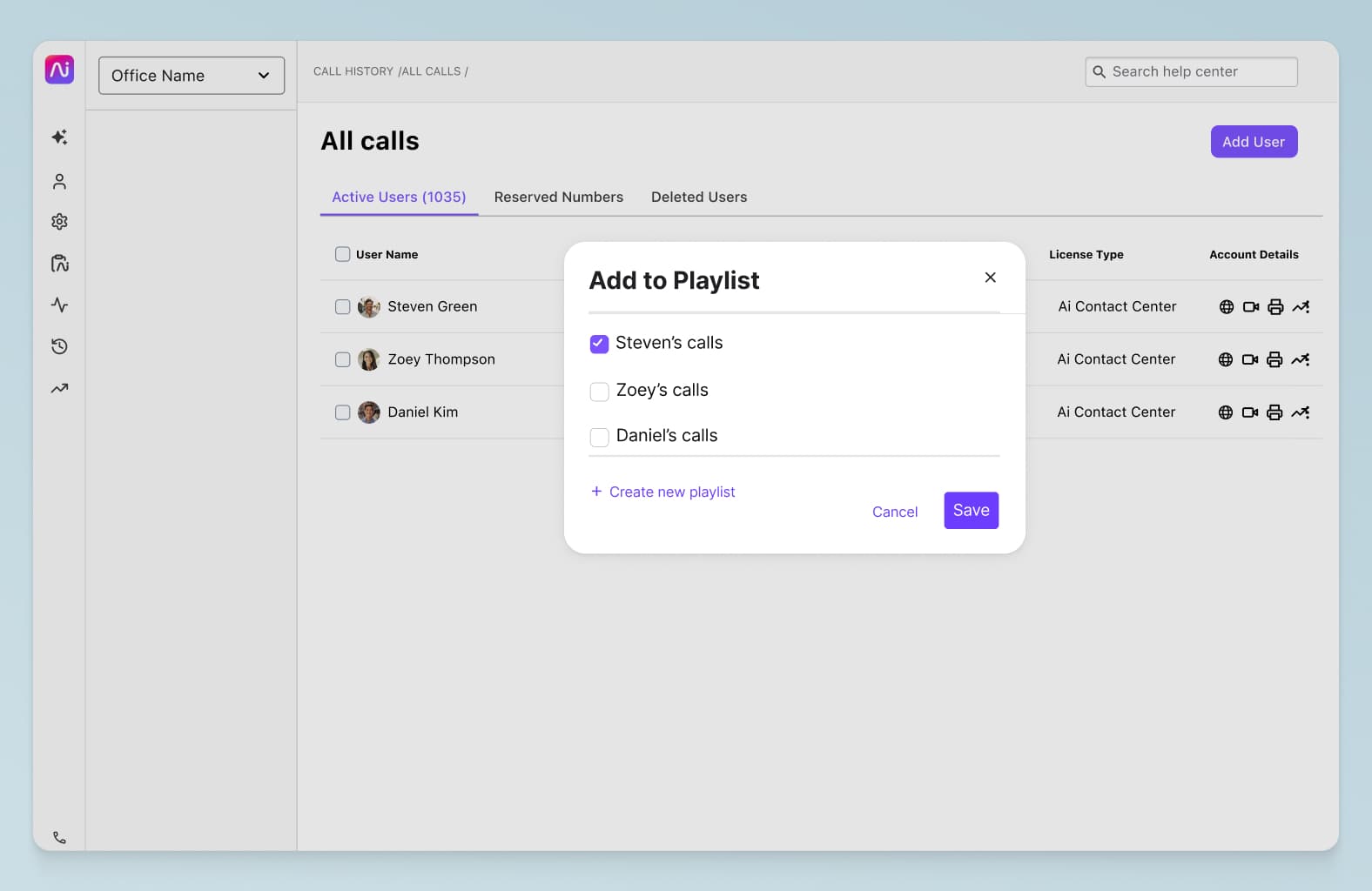
Depending on your resources, of course, you may be in a position to hire a training company to help too—these companies typically have specialised programs for sales professionals and may be able to support remote teams too.
2. Share sales success stories
On a related note, share success stories! These are often the best teachers when it comes to sales training, and case studies can not only give new sales reps real-life examples of how to close deals, but also reinforce training for more experienced sellers.
It’s not just a case of sharing the actual sale itself—but how the person achieved it, what sales technique they used, how they overcame objections, etc.
Again, make use of your call recordings as part of training—in Dialpad, all of our salespeople can see their recordings in the desktop and mobile app, in the same place where they can check their voicemails, start phone and video calls, and a lot more. They don’t need to toggle between different apps or windows, and it’s been huge for accelerating their activity and helping them be more productive:
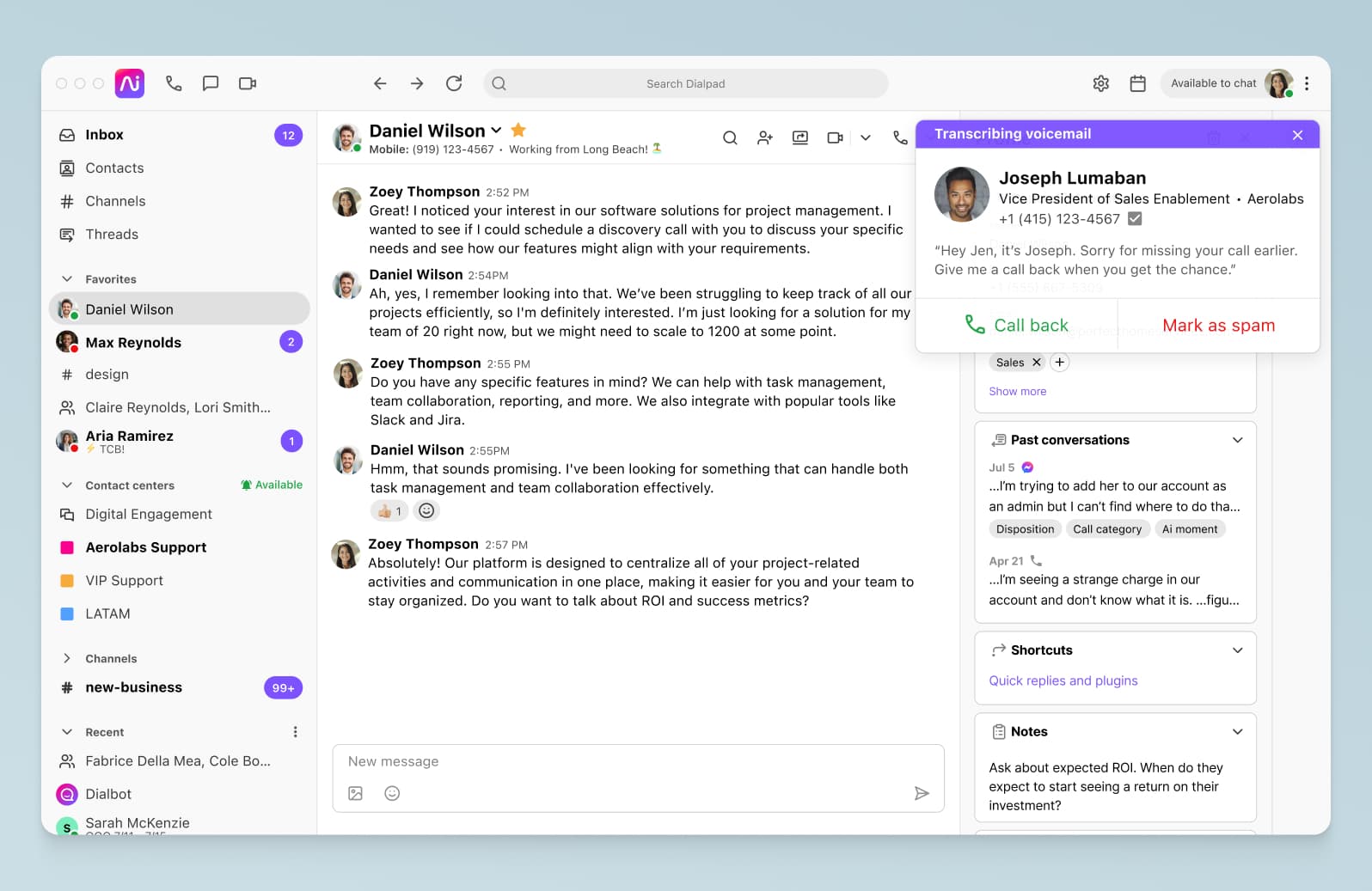
3. Provide constant and constructive feedback
This is a really important one—and both parts of this are important. Focusing purely on criticism doesn’t always help and can dent a seller’s confidence. And if you don’t provide feedback on a regular basis, you risk missing out on opportunities to keep your sales team updated on changes in the industry.
And of course, most feedback originates from your customers and prospects—but how do you track this feedback?
In Dialpad, we can create Custom Moments, which help us track how frequently certain topics are brought up on sales calls. (Learn more about sales call reporting and planning.) For example, if you’re interested in how often a competitor’s name comes up, you can create a Custom Moment for that!
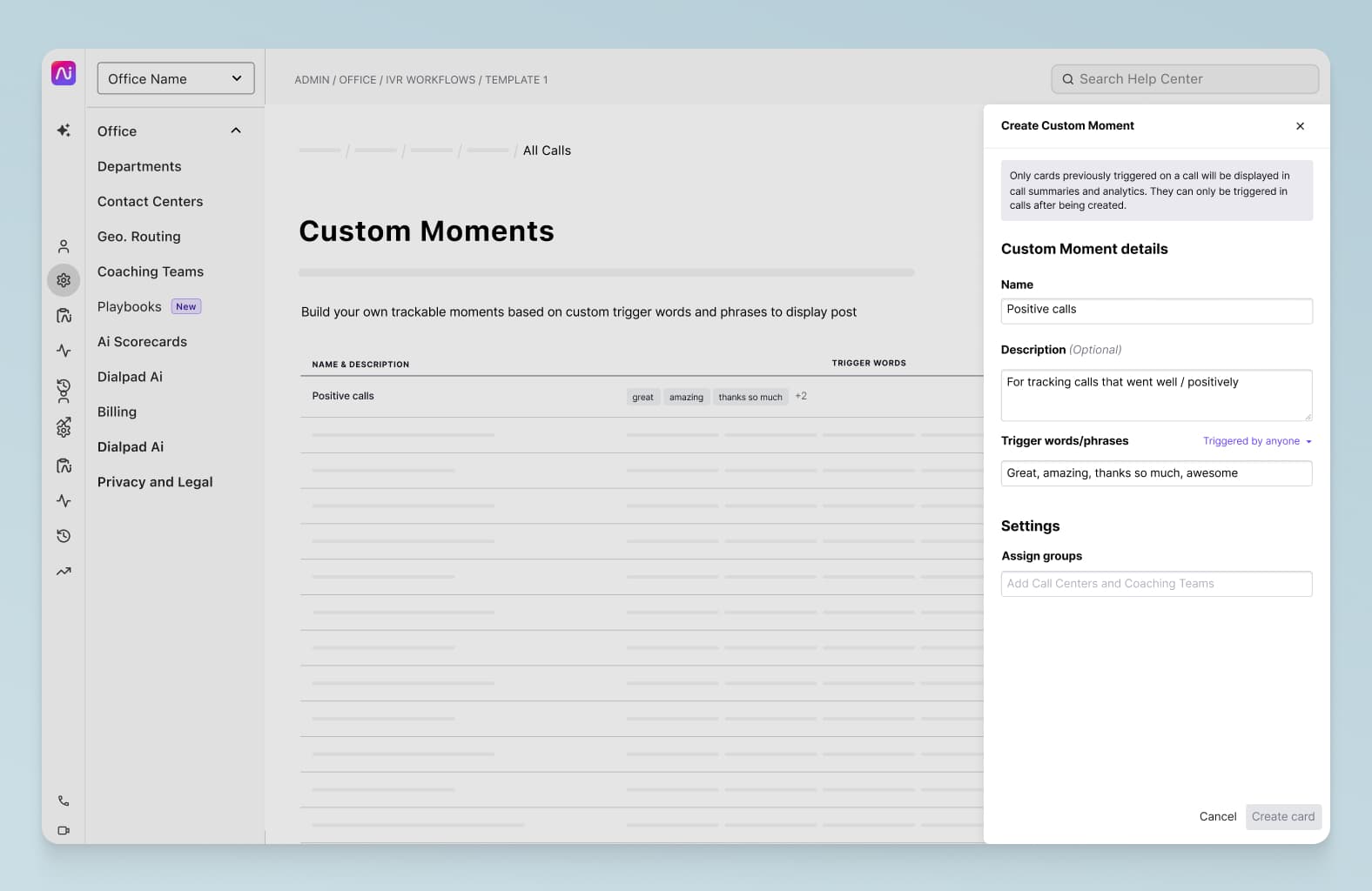
We can then see, in Dialpad’s analytics, how these moments are trending over time and keep an eye on what we need to train sellers to talk about:
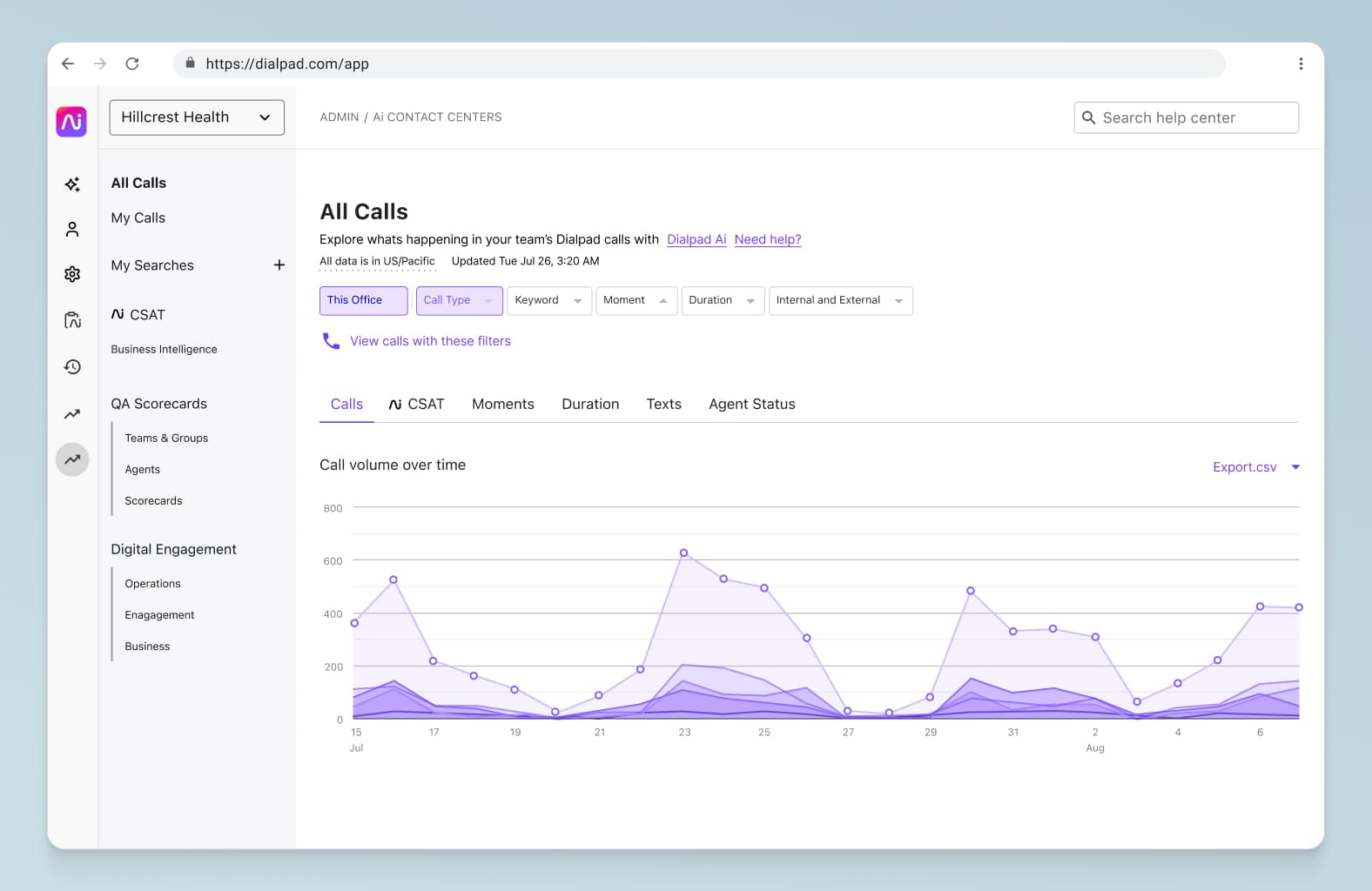
4. Scale your sales training where you can
Here’s the thing. In most cases, you’re one person overseeing a team of sales reps—all of whom will need your help at some point. But you can’t be sitting on every single sales call and teaching everyone new skills.
So, look for ways to automate your sales training where you can. Some of the things I mentioned earlier, like using call recordings as a training tool, can already lighten the load, but there are cloud contact centre platforms and other software that will help with this too.
For instance, with Dialpad, we can create Real-time Assist (RTA) cards, which are like cheat sheets that automatically pop up on our reps’ screens when certain words are spoken on sales calls.
For example, we can create an RTA card about how to port a number (which we can set to trigger when a customer says “port,” “porting,” and any other related words)—but you can easily create an RTA card for pricing, and set that to pop up whenever a prospects says “cost” or “price”:
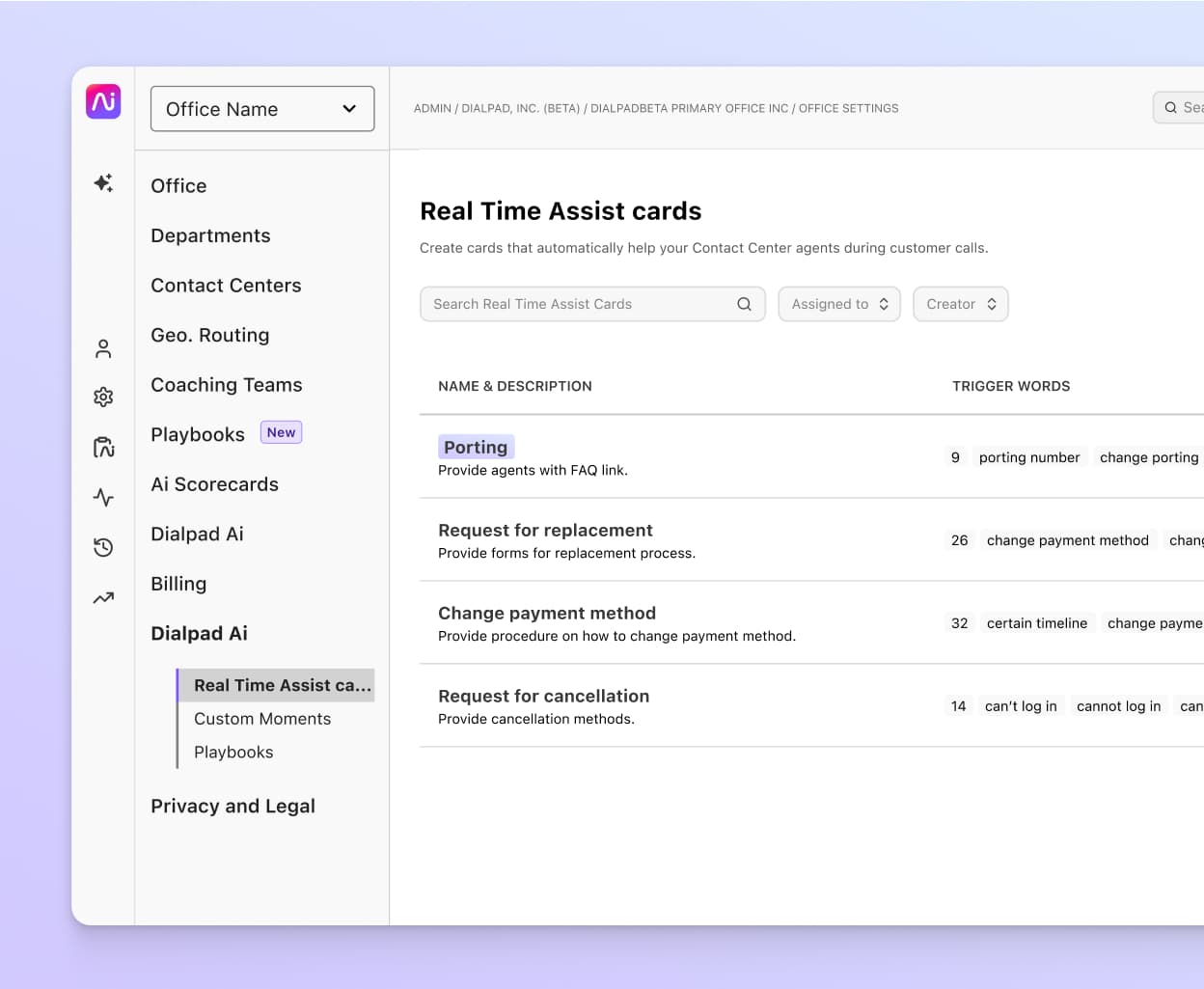
5. Schedule shadowing sessions for new reps
Shadowing is when a trainee watches (and listens) or accompanies a more experienced member of your team on the job.
For field sales, that would involve the trainee actually going on the road with a sales leader to see how the experienced salesperson operates and how they communicate with customers.
For any type of inside sales, technology would come to the rescue once again. The trainee doesn’t have to be in the exact same physical space as the person they’re shadowing—you can use call recording and monitoring to listen into calls.
For example, with Dialpad, it goes both ways—you can have new hires shadow more experienced salespeople on sales calls, and also have sales managers listen in on calls that these new reps are having.
6. Assign a designated mentor for each trainee
If you can, it’s worth assigning a mentor to each new staff member whenever possible. This gives your new staff someone to reach out to and ask those really specific on-the-job questions.
It also helps build bonds between existing team members and new hires.
Mentors don’t have to come from your training team, but would ideally be experienced team members and sales leaders who can share their know-how.
6 areas your sales training program should cover
1. CRM training
The advantages that technology can offer your sales teams can’t be understated. One of the best tools that sales teams can use is a CRM (customer relationship management) solution. This is your treasure trove of customer information that tells you about their previous behaviour, identifies potential sales prospects, and gives you the best chance of making a connection.
If you use Salesforce, Dialpad’s integration with it can embed a power dialler right in your Salesforce dashboard and automatically log activities to streamline your team’s workflow:
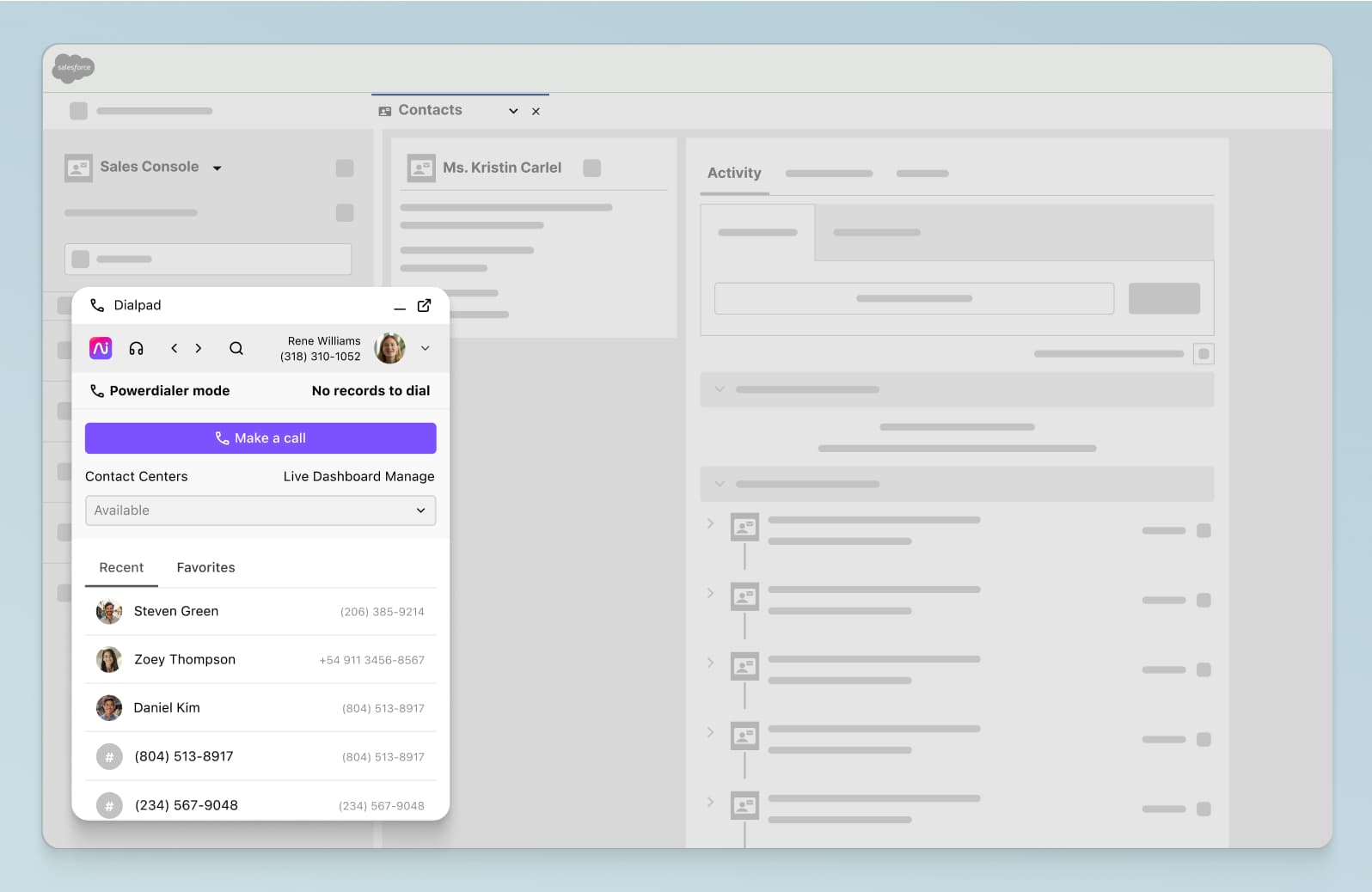
Dialpad also integrates with other CRMs like HubSpot and again, it embeds a CTI dialler inside those tools and the integration automatically logs every call as well as voicemails, messaging, and full transcripts:
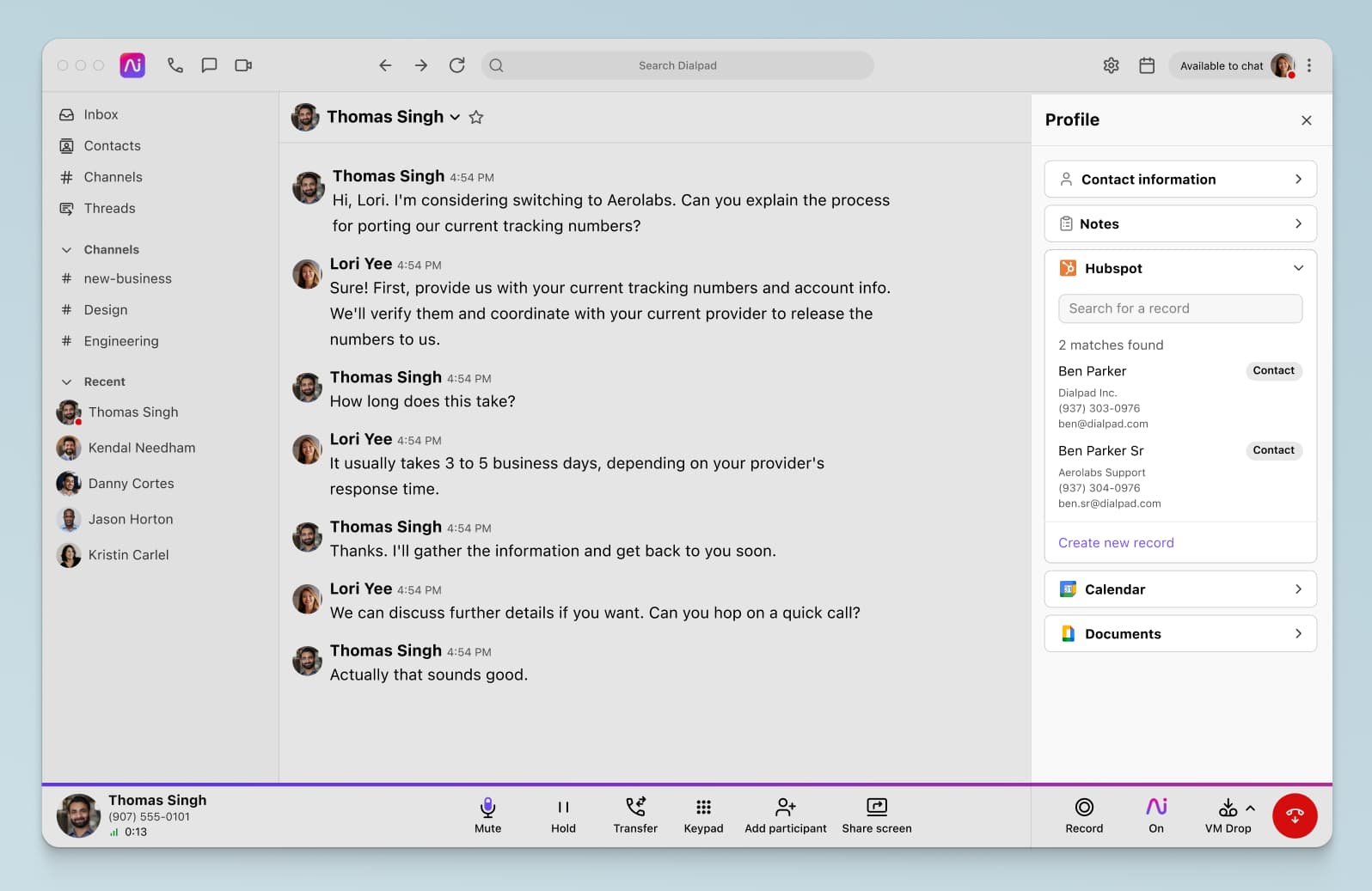
Whatever roles your sales teams are in, the technology they use (and don’t forget about social media platforms like LinkedIn) will likely be a major part of how they work. The tools you may use can differ according to industry and roles. Dialpad not only provides a unified communications platform but also integrations with a wide range of apps including Google Workspace (collaboration), Outreach (sales engagement), and many more.
2. Fundamental sales skills and actionable knowledge
Not everyone comes to sales with a background in sales. (In fact, some of the best salespeople often have very diverse backgrounds in other industries.) Knowing how to equip your trainees with the most vital selling skills is the foundation for their work with your business. That knowledge should include:
Objection handling
Your sales process, from prospecting and generating leads to follow-ups
Negotiation
Active listening
Product and organisational knowledge, and relevant pricing strategies
Presentation (role plays are great for this)
Basic tech skills (even if you’re not in tech, you probably use tech to communicate with prospects)
3. A well researched market
Your sales teams need a wide knowledge base to do their jobs effectively. And maybe the two most crucial bits of that knowledge are A) your products or services and B) the market you’re in.
Knowing all the features of the products they are selling and their benefits is important, yes, but knowing the market and your competitors is also crucial. Prospects can shop around online at their own leisure more easily than ever before, and if you have competitors, they’ll likely know about them.
Your sellers have to be ready to speak to these—convincingly.
👉Dialpad tip:
Want to help your sales reps understand the market and competitive landscape better (and more quickly)? Create a playlist of calls where your competitors have come up in sales conversations.
4. Empathy and understanding for the customers
Some of your training has to focus outwards rather than inwards. After all, it’s no use having a rep with amazing business and product knowledge, but no empathy with your prospects.
Understanding your customers, their behaviours, their wants and desires, and what makes them decide to buy not only affects your sales figures, it helps provide a more positive buying experience. (And a good customer experience means you will more likely see good customer retention figures.)
5. Ongoing evaluation and improvements
Evaluating your sales training program is as important as evaluating the sales readiness of your trainees. Besides, the effectiveness of your training will have a direct influence on how good those trainees will turn out. You should evaluate your training program with four goals in mind:
Improvements. The whole point of evaluating your program regularly is to identify any areas needing improvement. Every year, your team should be a bit more knowledgeable—and hitting higher numbers. Is your program helping them do that?
Retention. Good training, and ongoing development, makes employees feel more valued (and more confident in their duties). If you invest in ongoing training and development, employees are likely to be happier and to stay with your org.
ROI. You always have one eye on your bottom line—and making sure that your sales training provides a good ROI should be a part of that consideration. After all, well-trained reps are key to increasing your profits and future growth.
6. Customer support and success teams
Many roles that are primarily inbound customer-oriented or servce focused will have sales aspects within them. For example, upselling and cross-selling during a customer service call can be major contributors to a company’s revenue stream.
This means if you’re training new agents, you might want to teach sales competency across these different roles. Customer Success teams don’t always sit under the sales org, but if you can exert some influence here and provide sales training opportunities for these folks, here are a few things to focus on:
Instill the habit of encouraging brand loyalty in customer conversations
Teach them how to resolve issues and ensure customer satisfaction while being able to identify potential sales opportunities
Find a way to measure sales performance for these non-traditional sales teams
Build an understanding of consultative selling
Help them recognise that aligning customer support or customer success with sales will drive your business’ organic growth
What kind of sales training is your team considering?
It doesn’t matter what industry you’re in, whether you’re doing outreach on the phones or social selling on LinkedIn, or whether you do B2C or B2B sales—an effective sales training program is essential.
From real-world examples to role-playing, try to incorporate different interactive elements to keep folks engaged and help them retain information.
Remember: at the heart of nearly every successful sales team lies consistent training. And more often than not, it involves the strategic use of technology as well to automate the repetitive and low-value tasks—while allowing sellers to focus on the valuable part of the job: closing the deal.
See how Dialpad can help remote teams with sales training!
Book a demo of Dialpad and see how it can help your sales org accelerate activity and win more deals. Or, take a self-guided interactive tour of the app on your own!








